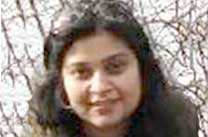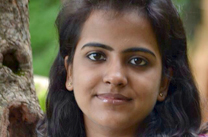 |
Divya Sharma, PhD Student, TERI University As a PhD student in the HI-AWARE programme, I am hoping to have a transforming experience in terms of learning. I am positive that we, as a team, will be able to do impactful collaborative research in the field of Climate Change Adaptation and Resilience. |
When thoughtful minds come together on platforms like HI-AWARE, the probability of creating the intended outcomes increases substantially and I am looking forward to that.
 |
Sudeshna Maya Sen, PhD Student, TERI University My experience under the HI-AWARE project till now has been very enriching. It is helping me understand the hardships of mountain communities, their lives and struggles; and how they are facing up to and combatting challenges like climate change. I expect HI-AWARE to open up avenues of research that I haven’t explored yet and help me learn and develop new ideas. |
The project would help me combine my interests in bringing innovative adaptation practices developed through a confluence of local knowledge and scientific reasoning into the policy domain, and replicating them for the benefit of a wider audience.
 |
Yamini Yogya, MSc, Environmental Studies and Resources Management, TERI University To be honest, when I learned I had been accepted as an intern on the HI-AWARE project, I was a tad overwhelmed. While on the one hand, to be part of a project of such stature and promise was a huge opportunity for me, it was also slightly intimidating. This was to be my very first transition |
from days of burying my nose in literature about climate change adaptation to venturing into the field and finally applying the theoretical concepts into practice. It is difficult to sum up the experience in one paragraph, and to say that this project has taught me a lot would still be a gross understatement. This project, for me, though physically taxing and theoretically challenging, was equally rewarding in some respects, both in light of inter-personal relationships that were established with the team and communities, and the broader stakes that the study seeks to explicate.
 |
Ganesh Gotri, MSc, Climate Science and Policy, TERI University The opportunity of an internship at the HI-AWARE consortium fitted very well with my professional aspirations. This, coupled with the amount of research I would be exposed to during the course of the internship, only made things much better. Also, for a person who seeks |
adventures and enjoys being amidst nature, this opportunity couldn’t have been more exciting. There is so much to take back from my time here, academically and otherwise, and I am looking forward to what is left of this internship. The treacherous treks and rides to reach villages, the long travel hours were all tough, but in the end were fun. Moreover, on knowing that I am going to be a part of a change in helping people adapt has made the whole experience more memorable.
 |
Shreya Trivedi, MSc, Environmental Studies and Resource Management, TERI University For my dissertation, I am working with the HI-AWARE project at TERI. My time spent working with the HI-AWARE project has been very informative and enlightening. I am working for the Research Component 2 (“socioeconomic, gender and governance drivers of climate vulnerability”) and Research Component 3 |
(“monitoring and assessment of climate change adaptation practices”) of the project. Interning in this project provided me with a wonderful opportunity and a knowledge-enhancing experience to explore the most remote and inaccessible villages in the Sikkim and Darjeeling/Kalimpong region. This project also helped me enhance my understanding of conducting field studies using a Participatory Rural Appraisal (PRA) approach. This project gave me exposure to the ground realities that people face in isolated areas. It provided me with an understanding of the different problems faced by the people owing to changing climate and how they are coping with them. This project also gave me a deeper insight of how certain factors act as vulnerability drivers and affect the wellbeing of people, their living conditions and their livelihoods. Understanding the problems faced by the people and asking for their solutions is how I learned about the traditional practices and the adaptive methods adopted by them. Institutional mapping (Research Component 3) helped me in understanding how policies and institutions play an important role in addressing and solving the problems faced by the people. I also realised the importance of integrating the ideas of local people and their perspectives in framing the policies and schemes by the government. The practical experience also helped me in building my understanding of the various benefits provided by the government for the people and how it is transferred to them. In short, HI-AWARE provided me with a lifetime opportunity to visit a beautiful state not as tourist but as a scholar for exploring the ground realities, interacting with people with different opinions and culture and how they perceive their surroundings.
 |
Vishaka Gulati, MSc, Environmental studies and Resource Management, TERI University I started working as an intern in the HI-AWARE Project at TERI in December 2014. I was assigned the Research Component 2 component (“socio-economic, gender and governance drivers of climate vulnerability”) for the Teesta Basin. In this project I was required to do an extensive |
literature survey of the Teesta basin and was also involved in the field work to conduct situation analyses in Sikkim and the Darjeeling-Kalimpong area. My experience of working in this project has been quite interesting and it provided me with many learning opportunities. Through the field work, I was exposed to the social component of research, which is an integral component of any research work. I realised how people’s perceptions play an important role in any study and is as important as any scientific component. During these field trips I realised how people in rural areas are aware about the changes in their surroundings and are adapting to climate change through their traditional practices.
Furthermore, I came to know about the role of the policies and various institutions initiated by the government and how they are helping the people to cope with the changing climate: many local NGOs have come up in this region and they are actively helping the people. This project gave me a once-in-a-lifetime opportunity to visit the rural areas, some quite remote. It helped me in understanding the ground realities and I even learnt about many different cultures and traditions of the state.
